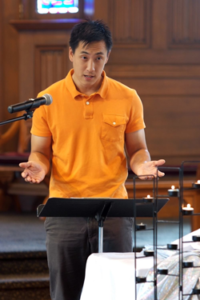
The Proclamation of Mike Brown
I teach preaching at Drew Theological School. Two sets of questions guide my pedagogy. One involves hermeneutics: I compel my students to ask, ‘How does “preaching” manifest beyond our words and in the larger world?’ and ‘Why should we pay attention to what others have to say?’ The other set wrestles with theodicy: ‘How do we keep the faith when our words do not suffice?’
The killing of Michael (Mike) Brown haunts those homiletic interrogatives because he made a proclamation before being gunned down.
Brown offered a message of salvation on the day of his death. “Okay, Okay, Okay” Brown announced as he struggled to keep his hands up according to an eyewitness. Had Brown’s communication been received Brown would not only still be living. Darren Wilson would not have shed the blood of his brother and sinned against God. Instead Wilson kept firing. At that point the repetition of three ironic but very straightforward words became instead a tragic permutation of “It is finished.”
Brown’s death punctuates the long and disproportionate history of white males gunning down young black men. Consider the peculiar twists of the case at hand. Darren Wilson lost his job three years ago due to dysfunction between a mostly white police force and a nearly 90% black residential population in Jennings, Missouri. Prosecutor Bob McCulloch’s father, a police officer, was shot and killed by a black assailant in the 1960’s. Is that why McCulloch passed on charging Wilson directly and instead shifted deliberations to a grand jury consisting of 6 white men, 3 white women, 2 black women, and 1 black male? (Indicting Wilson will require 9 votes.) Who can resist speculating?
 Brown’s death also echoes the futility of what were perhaps his last three words. What was the purpose of Wilson shooting Brown in the first place and why so venomously? Naming a single form of hatred like racism of course only scratches the surface. Wilson and American justice have betrayed Brown not only because of his age and skin color. Social location and economic status have significantly skewed calculations regarding the worth of his life. His fate therefore indicts the underlying values of power, voice, and representation in U.S. society.
Brown’s death also echoes the futility of what were perhaps his last three words. What was the purpose of Wilson shooting Brown in the first place and why so venomously? Naming a single form of hatred like racism of course only scratches the surface. Wilson and American justice have betrayed Brown not only because of his age and skin color. Social location and economic status have significantly skewed calculations regarding the worth of his life. His fate therefore indicts the underlying values of power, voice, and representation in U.S. society.
This semester in an elective exploring histories of Asian American preaching and worship I am endeavoring to help students untangle homiletic history from a predominantly black and white binary and bear witness to the historical diversity of preaching by examining Asian American contributions from the 19th century onward (the 18th century perhaps if we can find something in the records of the 1763 Louisiana Filipino settlement known as Saint Malo). The class hopes to broaden the very definitions of what we presume by “American” and “preaching.”
Although the tragedy of Mike Brown shows in a different and extreme register why the historical trajectory we are trying to correct prevails and still needs redemption and theological examination, in my “Asian seminar” my students and I must grapple with the senseless killing of Brown not only because his death prototypically represents deeply entrenched racism in America. Though it does. Rather, his death and the violence that still rages around it show precisely why we can never rest from revising how we understand the categories of “American” and “preaching.”
Ferguson reveals how capricious and yet predictably disappointing “American” culture can be. Mike Brown made a theologically profound declaration moments before he was mercilessly shot. His words were not enough. And since August 9, 2014, a memorial for Brown has been engulfed in flames. Looting, vandalizing, and aggression against the police continue. So, how will we keep the faith in my classroom? Maybe the courts will bring good news soon. But what I have witnessed so far suggests that comprehensive healing will ultimately depend upon more than we can say.